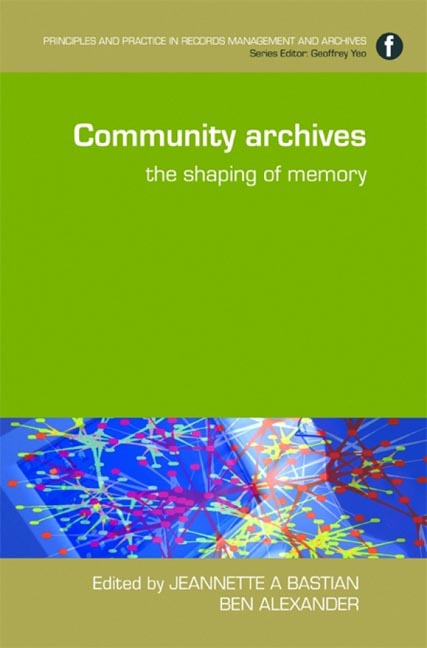Book contents
- Frontmatter
- Contents
- Introduction to the series
- Acknowledgements
- Contributors
- Introduction: Communities and archives – a symbiotic relationship
- Part 1 A community archives model
- Part 2 Communities and non-traditional record keeping
- 3 The Single Noongar Claim: native title, archival records and aboriginal community in Western Australia
- 4 Oral tradition in living cultures: the role of archives in the preservation of memory
- 5 We are our memories: community and records in Fiji
- Part 3 Records loss, destruction and recovery
- Part 4 Online communities: how technology brings communities and their records together
- Part 5 Building a community archive
- Conclusion: The archivist and community
- Bibliography
- Index
- Miscellaneous Endmatter
- Miscellaneous Endmatter
- Miscellaneous Endmatter
3 - The Single Noongar Claim: native title, archival records and aboriginal community in Western Australia
from Part 2 - Communities and non-traditional record keeping
Published online by Cambridge University Press: 08 June 2018
- Frontmatter
- Contents
- Introduction to the series
- Acknowledgements
- Contributors
- Introduction: Communities and archives – a symbiotic relationship
- Part 1 A community archives model
- Part 2 Communities and non-traditional record keeping
- 3 The Single Noongar Claim: native title, archival records and aboriginal community in Western Australia
- 4 Oral tradition in living cultures: the role of archives in the preservation of memory
- 5 We are our memories: community and records in Fiji
- Part 3 Records loss, destruction and recovery
- Part 4 Online communities: how technology brings communities and their records together
- Part 5 Building a community archive
- Conclusion: The archivist and community
- Bibliography
- Index
- Miscellaneous Endmatter
- Miscellaneous Endmatter
- Miscellaneous Endmatter
Summary
[Editor's note: In August 2008, the Fourth Annual Conference on the History of Records and Archives (ICHORA IV) was held in Perth, Australia. The theme of the conference was ‘Minority Reports: indigenous and community voices in archives’. The following keynote address by Glen Kelly is reproduced, with some minor editing, in its entirety.]
Introduction
First of all, let me acknowledge the Traditional Owners of this place, the Whadjuk Noongars. This isn't something that I say f lippantly; my family are Traditional Owners in the lower south west of the state. I am a Wardandi Noongar, so I make that acknowledgement as an outsider, to state that I recognize the primacy of the Whadjuk Noongars in this country and to pay my respect to these people.
Let me also acknowledge the organizers of this conference and thank them for asking me to present this keynote address. I must say that the history of archives and records is an area that is a little out of my expertise; however, in developing this address, I have been able to reflect on a number of things that are important to my business and it has given me some fresh insight into a number of areas that are central to my role in a native title representative body and the creation of evidence to support native title claims.
By way of introduction, my name is Glen Kelly. I am a Wardandi Noongar, obviously with European heritage as well, and am the Chief Executive Officer of the South West Aboriginal Land and Sea Council (SWALSC).
SWALSC is a community organization with a membership of some 2500 Noongar people, and we are very much an organ of the Noongar community. SWALSC is also the Native Title Representative Body (NTRB) for the south west of Western Australia, that is, we have been certified by the Commonwealth Government to deliver services as defined in the Native Title Act (1993). As a result, SWALSC has statutory functions which are, broadly speaking, the representation of native title claims.
This of course shapes the types of things that I am going to speak on today, and the general context will be from the direction of a native title representative body and native title claims.
- Type
- Chapter
- Information
- Community ArchivesThe shaping of memory, pp. 49 - 64Publisher: FacetPrint publication year: 2009
- 5
- Cited by



